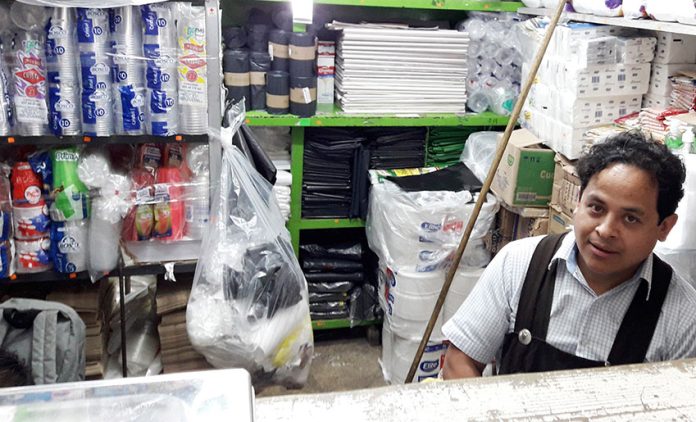Ben (Dustin Hoffman), the aimless graduate in the 1967 movie of the same name, was given career advice by a neighbor. “One word: plastic.”
But unfortunately, as with so many new technologies, plastic has turned out to be not only a blessing, but an environmental curse.
To help get a handle on plastic pollution, Mexico City’s government will ban plastic bags effective December 2020 and most other single-use plastic products effective January 2021. The ban was approved by the capital’s Congress, 51 in favor, zero against, and one abstention.
Mexico City will be in good company, joining many other major cities and countries in banning bags and other plastic items — Washington, D.C, San Francisco, Seattle, Boston, Kenya, Chile, the United Kingdom, Australia and China.
Banned items will include plastic cutlery such as forks, knives, spoons, coffee stirrers, trays, plates, cups and straws. Q-Tips, balloons, coffee capsules and tampon applicators made from plastic will also be banned.
The moratorium on single-use plastic takes effect in 2020 to give businesses time to change their production lines to biodegradable materials. “These are gradual processes, as the conversion of technologies requires time to minimize the economic impact,” said National Action Party politician Mauricio Tabe Echartea.
Mexico City currently recycles six out of every 10 plastic bottles, a level on par with European countries. However, even easily recyclable plastic such as PET (polyethylene terephthalate) cannot be considered truly sustainable. New bottles must have “virgin” PET introduced along with recycled material.
Additionally, the polymers in PET break down after repeated recycling, meaning that after only two or three cycles they must be dumped in landfills or incinerated. Mexico currently generates around 722,000 tons of PET waste per year.
Glass and aluminum, on the other hand, can be recycled repeatedly. From an environmental perspective, glass bottles are the clear winner. It takes twice as much fossil fuel to produce a plastic bottle and the manufacturing process releases five times the greenhouse gases while requiring 17 times as much water.
The new law makes an exception for biodegradable plastics. These are defined as “material susceptible to a minimum of 90% biodegradation in six months.” But, for biodegradable plastics to break down, they must be in an environment with the right amount of heat, moisture, carbon dioxide and microorganisms. A biodegradable plastic bag thrown into the ocean, for example, will not decompose.
The National Association of Plastic Industries (ANIPAC) issued a statement lamenting the new ban. The industry group claims the economic effect will be too great for citizens of the capital to bear and rejects the value of biodegradable plastics because of the strict conditions needed for them to break down. ANIPAC urges the government to reconsider its time frame.

The ban will affect small family-run businesses as well. Public markets in Mexico City have puestos dedicated to disposable plastic and Styrofoam products. Mexico News Daily spoke to Juan Carlos Collazo, an employee of Materias Primas Charlie located in Mercado Independencia, where plastic cups, Styrofoam trays and dozens of other single-use items are sold.
“Plastic and Styrofoam are what we sell the most. We sell other things too, like napkins and sugar, but what [the city government] is taking away from us is essential to our business. We can buy biodegradable materials, but they cost much more. Containers for hot drinks cost 40 to 50% more,” Collazo said. When asked about the environmental impact of Styrofoam and plastics, Collazo mentioned Mexico City’s water problems.
“Around here, the water cuts off all the time. When people can’t wash their dishes, they need disposables . . . If everyone is using more water to wash plates in homes as well as in businesses, we’re going to run out of water even more frequently.”
Collazo points to labeling on Dart brand Styrofoam cups which he sells: “Dart Cups—The Environmental Option.” The plastic sleeve around the cups states that Dart never manufactures with CFCs (chlorofluorocarbons), that the cups are recyclable and that their manufacture uses less energy and a cleaner manufacturing process than paper cups.
But Mexico City currently does not have a recycling program for Styrofoam. The process to recycle is said to be very costly and can only been done at a loss. Unlike paper, Styrofoam can persist in the environment for a million years.
While vendors will continue to sell single-use plastics until the ban takes effect, Collazo says that to stay in business he will have to change his inventory. Even the oxo-biodegradable bags he currently sells will be banned. “We will have to use biodegradable, even if it is more expensive.”
If the graduate’s neighbor were giving him career advice today, it might be: “Plastic, but not single use.”
The writer lives and works in Mexico City.
